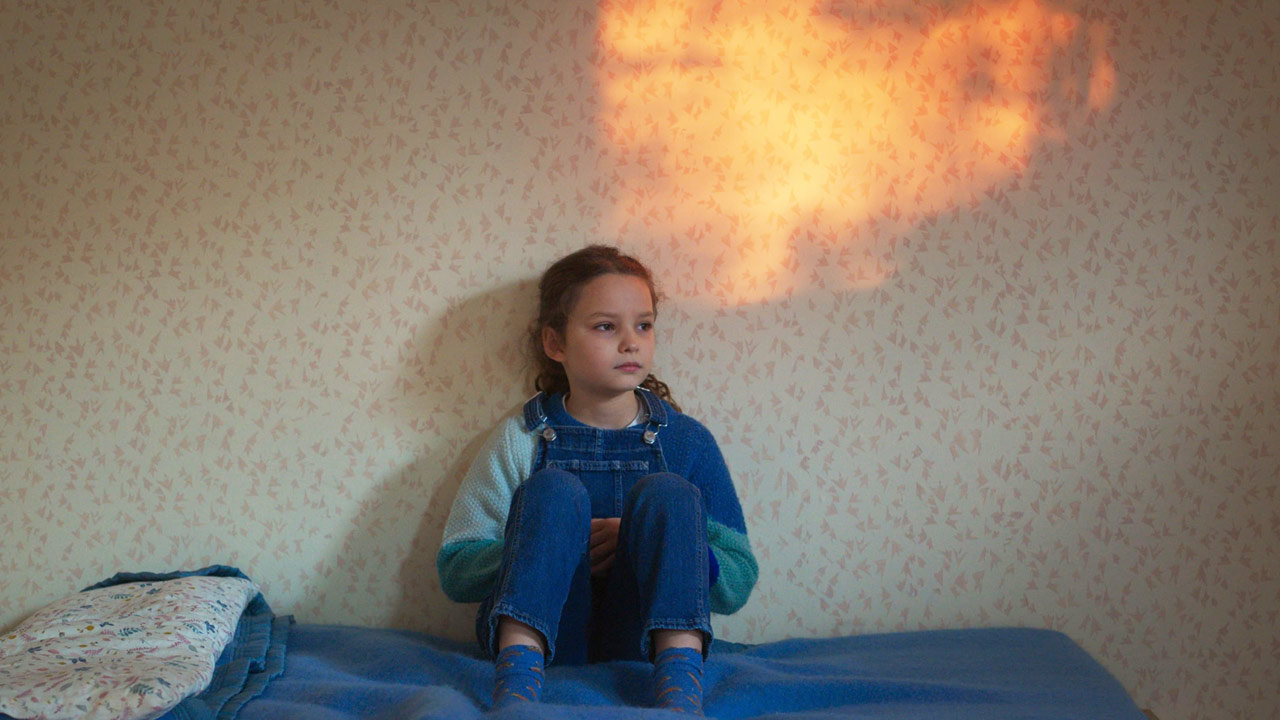Sweet, surreal fantasy Petite Maman shows Céline Sciamma in total command of the visual medium

Following up her acclaimed period drama Portrait of a Lady on Fire, Céline Sciamma again demonstrates her total command of the visual medium in this sweet and surreal fantasy film, writes writes Rory Doherty.
Rarely does a running time express the central themes of a film, but those familiar with Céline Sciamma know that nothing in her work is ever by accident. Petite Maman, her fifth feature, clocks in at 72 minutes, but its brevity is not due to lack of content. Its compact running time holds within a rich, compassionate heart and a further demonstration of Sciamma’s complete command of the visual medium.
A young girl Nelly (Joséphine Sanz) accompanies her parents to her mother’s childhood home to aid them in clearing out her the possessions of her grandmother, who has recently passed. Her mother (Nina Meurisse) disappears, affected by the uncomfortable memories the house provokes. The minutiae of the mother’s emotional crisis isn’t broken down in great detail, because Sciamma roots the film firmly in the perspective of Nelly—and the thorny ways grief confounds us is too complex an issue for adults to explain to an eight-year-old.
But as it turns out, there are things going on that only children can understand. When playing in the woods, Nelly encounters another young girl, Marion (Gabrielle Sanz), who she quickly realises is her mother, as she was as a child.
This act of magical realism is Petite Maman’s most obvious engagement with the theme of time, but Sciamma’s fantasy film engages with the concept in other ways. With such a short film, every second counts, the director’s economic style making every camera cut and line of dialogue push the characters’ journeys onwards.
Just as Nelly comes to understand time’s effect on her mother and grandmother, so too does Nelly appreciate the finite time she has with Marion. This is where the 72 minute length has the most significance. The viewer joins Nelly in a growing awareness that her time with Marion will shortly come to an end, so they need to cherish each other before it’s too late. There’s a tangible pressure to, through others, become whole again.

There’s no time to explain the mechanics of Nelly and Marion’s time-jumping, but even if there was, Petite Maman would be worse for attempting it. This is a film filtered through the lens of children, and the insistence of logic and explaining the impossible would signal the presence of a limited, grown-up perspective it does better without.
With her sophomore feature Tomboy, Sciamma demonstrated a confidence in the ways children can drive narrative. Their speech, while never complex, is often revealing; what they say is rarely as loaded or concealing as that of adults. As Nelly probes her genial father on the maternal relationships that have become suddenly absent, Sciamma gives us a keen insight into her psychology that Nelly may not know she’s admitting.
When Nelly’s with Marion, it’s striking how intelligent Sciamma has written them. They quickly realise who each other is, there’s no concealment between them, and only from the adults do they withhold information. The power dynamics at the start of the film clearly shift; the children’s invaluable connection means they know more than their parents do.

Petite Maman is a decidedly sweet story, but Sciamma goes to great lengths to avoid what she calls “emotional porn.” Like her other recent features (which include Portrait of a Lady on Fire) there’s barely any musical score to instruct you how to feel. Rather we sit in the ambient noises of the house and the forest. Her peerless shot composition, in a second collaboration with cinematographer Claire Mathon, continues its exact, dynamic framing that reveals much without having to explain details to the audience. Petite Maman’s sweetness works because there’s an emotional truth to its story; connecting with those we love would be easier if we met at different times in our lives.
If there were any drawbacks, it’s in the insistence of the style of economy. Sciamma again shows her trademark balance of thematic subtleness and directness, but with such a short running time it leaves a tiny nagging feeling that an extra scene could have softened out the execution of the ideas at play. But Petite Maman is too much of a treasure to want any of it to change. It’s so delicately constructed, you feel like any interference would cause it to break, and its rewarding emotional journey would be lost.



















